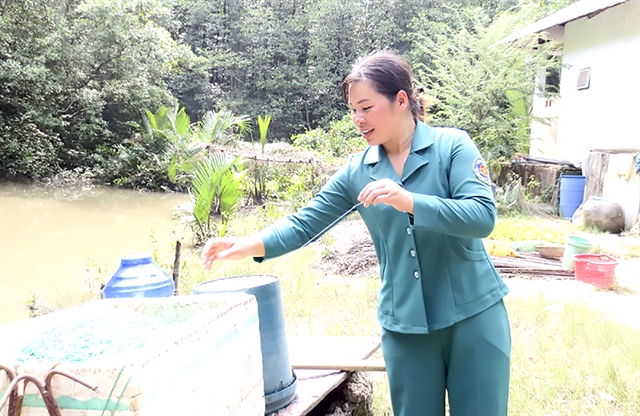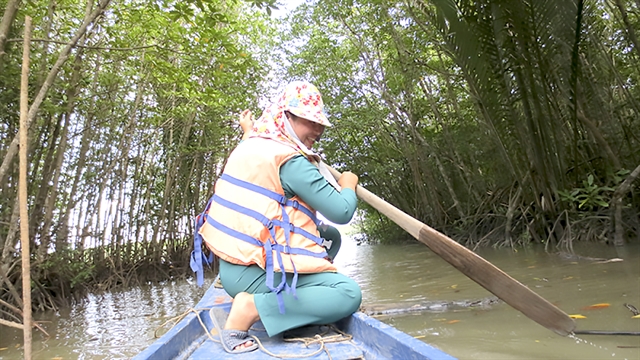 |
| Oanh prepares a styrofoam box to collect rainwater for growing vegetables in front of the forest guard post — Photo cand.com.vn |
HCM CITY — People often say that forest protection is a job for men. However, in the Cần Giờ mangrove forests of HCM City, the green lungs of the city, many women are tirelessly safeguarding day and night.
Phạm Thị Oanh, 31 years old, a Mường ethnic woman from Quan Sơn District, Thanh Hóa central province, left behind the hustle and bustle of the city, making friends with the rivers, waters, and various wild species.
In 2011, Oanh came to Bình Dương Province to be a worker.
The bustling urban life, challenging to integrate into, sometimes made Oanh feel tired.
One weekend afternoon, while listening to a radio programme for making friends, she paused at a memorable entry belonging to Lê Hoàng Anh, a 30-year-old man.
Oanh phoned him to introduce herself and received a positive response.
In less than two months, the couple arranged to meet and officially began dating.
During their second meeting, Oanh decided to go with Anh to Cần Giờ District to meet his parents.
He took Oanh to the forest protection post where his parents were working.
While not her first time seeing a forest, Oanh found this area extremely unfamiliar because this forest is flooded, surrounded by the sea, completely different from the mountainous forests in her homeland, Thanh Hóa Province.
Spending a night at the forest protection post, experiencing mosquitoes and listening to the sounds of birds and animals, she developed a special connection with this forest.
Accepting her boyfriend’s proposal, Oanh left her job in Bình Dương Province.
They got married and took up the work of forest protection from Anh’s parents.
Oanh and her husband became the third generation in the family dedicated to forest conservation.
She officially became a forest guardian.
However, the challenging and hard life in the mangrove forest made Oanh cry many times.
First, she had to learn to control a small wooden boat with an engine, swim in the river, identify water currents, whirlpools and large waves to drive the boat safely.
As a farmer, Oanh quickly adapted in just a few days and could drive the small boat on the Lòng Tàu River safely.
Living in the deep forest, nights are the most haunting times. Mosquitoes fill the house, and insects form loud, buzzing swarms.
At 5pm every day, Oanh and her husband have to close all doors, put up a mosquito net, absolutely avoiding going outside, except for nights when they patrol the forest.
Oanh befriends the waves, with the sound of birds as her nightly lullaby.
The high tide usually comes around 10pm, the couple hold a bucket on their heads, carry a flashlight, and rush into the vast mangrove forest to catch crabs.
Each night, they catch over ten kilograms of crabs, earning a few hundred thousand đồng if they get a high price.
However, with the current crab price of just over VNĐ10,000 (US$0.4) per kilogram, they can’t earn much.
Spending the whole night, soaking wet and swimming several kilometres to catch crabs, sometimes they return with little money.
 |
| Oanh drives a small wooden boat to patrol the forest every day. |
When the sun rises, they patrol the 98-hectare portion of forest they manage in sub-zone 6, Zone III.
During their patrol, they also cut coconut leaves and harvest coconut fruits to supplement their income.
Freshwater is indeed precious in this mangrove forest.
During the six-month dry season, when freshwater is scarce, they have to travel nearly an hour by boat to buy freshwater.
They make this trip twice a month, reserving the water for cooking and drinking.
As for bathing, they simply dive into the river, and returning, they rinse off with a few scoops of freshwater.
“Sometimes there isn’t enough freshwater to wet the entire body, so some parts remain muddy, and others are still covered with sea salt. I’m a man and it’s okay, but I feel sorry for my wife,” Anh told Công An Nhân Dân (People’s Public Security) online newspaper.
One year after getting married, Oanh became pregnant with her first child.
Pregnancy and loneliness in the forest touched the heart of the woman.
Oanh missed home, her parents, and the fields, but these longings quickly faded in the face of the demands of daily life, finances, and the responsibility of protecting the forest.
“Because I love my husband so much, I try my best to live well with him. Love is the strength that keeps me here in this forest,” Oanh said.
Even while pregnant, Oanh steered her boat swiftly on the river, carrying a load of coconuts to sell, and at night, she still submerged herself in the water to catch crabs.
Oanh’s husband cared for her and often advised her to go home to wait for childbirth, but she also cared for her husband, choosing to stay in the forest with him.
Only a week before giving birth, Oanh returned to her husband’s parents’ house. And after giving birth, in just 11 days, she hugged her baby and returned to the forest.
Her child grew up in the forest, adapting to everything around. Oanh and her husband let their child get used to the water when their son was not even three years old.
The same went for the second child, a girl. They all love swimming in the river. Every weekend, they come to the forest with their parents and play in the water.
“My kids love the forest and the river more than anything else, perhaps they inherit these characteristics from their parents,” Oanh proudly said when talking about her children.
Near Oanh’s forest guard post, there are a few other posts, and some people have been attached to the forest since childhood.
In the early years of their marriage, there was no electricity or phone signal at the point.
Whenever Oanh wanted to call her parents in Thanh Hóa Province, she had to paddle several kilometres to get a phone signal.
“My parents couldn’t imagine their daughter’s life, marrying someone from the city, and facing such hardships. They were determined to visit me. I took them to the forest guard post to experience the real life here. They weren’t surprised. They were happy to see us living happily together,” Oanh said.
In the last two years, there has been solar power. Oanh bought a wifi device and hung it on a mangrove tree. On sunny days, the signal is good, but during rainy days it is bad, and there is also no phone signal.
The phone signal is inconsistent, but it brings a lot of joy to Oanh. She makes video calls to her family. Seeing each other’s faces regularly, the whole family stays connected, and the grandchildren can remember their grandparents’ appearance, preserving memories of family closeness for the future.
The forest protection salary for Oanh and her husband is less than VNĐ10 million ($409) per month.
Until now, she is still amazed at how she has been able to stand firm for the past 12 years in the face of the numerous difficulties in the forest.
“Not only is Oanh excellent at protecting the forest, but she also handles everything in this forest. I’ve never seen a sign of sadness on her face. Perhaps the sorrow has been deeply hidden, leaving only her simple and genuine love for the forest,” said Nguyễn Văn Sĩ, deputy head of Zone III, Cần Giờ Protection Forest Management Board. — VNS
- Reduce Hair Loss with PURA D’OR Gold Label Shampoo
- Castor Oil Has Made a “Huge” Difference With Hair and Brow Growth
- Excessive hair loss in men: Signs of illness that cannot be subjective
- Dịch Vụ SEO Website ở Los Angeles, CA: đưa trang web doanh nghiệp bạn lên top Google
- Nails Salon Sierra Madre
 VnExpress News The News Gateway of Vietnam
VnExpress News The News Gateway of Vietnam





